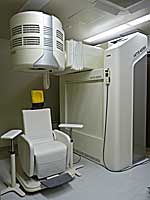11 October 2013
Hamamatsu develops next-generation PET diagnostic system for investigating brain disorders
 Hamamatsu, Japan – Hamamatsu Photonics K.K. has announced the successful collaboration with researchers from the Hamamatsu University School of Medicine to develop a next-generation PET diagnostic system for investigating Alzheimer’s disease and other brain disorders. The new system is expected to help physicians determine the correct treatment of various brain disorders, which has become an urgent issue in Japan due to the rising numbers among its aging population of patients with cognitive disorders, bipolar disorder, and Alzheimer’s disease.
Hamamatsu, Japan – Hamamatsu Photonics K.K. has announced the successful collaboration with researchers from the Hamamatsu University School of Medicine to develop a next-generation PET diagnostic system for investigating Alzheimer’s disease and other brain disorders. The new system is expected to help physicians determine the correct treatment of various brain disorders, which has become an urgent issue in Japan due to the rising numbers among its aging population of patients with cognitive disorders, bipolar disorder, and Alzheimer’s disease.
The new PET diagnostic system is the world’s first combination of a newly-developed tracer that reflects changes in acetylcholine-related cognitive functions and a new high-precision brain PET scanner that can correct the movement of a patient’s head. This combination is designed to overcome the limitations of current systems in measuring the brain physiology of severely impaired patients, due to the current requirement for patients to stay still for a long time during scanning. Today, little is known about the pathophysiological states in the brains of severely affected patients in vivo. The new system will help clinical researchers see new details, and thus contribute not only to the selection of appropriate treatment for individual patients regardless of their severities, but also to the future development of new drugs and new treatments for various neurological and psychiatric disorders.
Image: Newly-developed brain PET scanner which uses DOI (Depth-of-Interaction) detectors composed of Hamamatsu MPPC photodetectors and LYSO scintillator blocks segmented with a laser.
- Contact Information
- Name: Maria Fetta
- Email: fetta@hamamatsu.co.uk
- Website: www.hamamatsu.com

